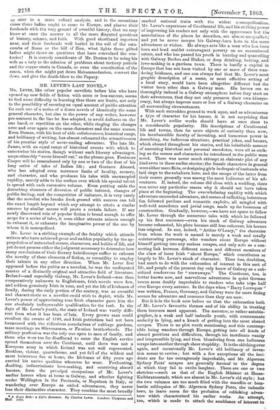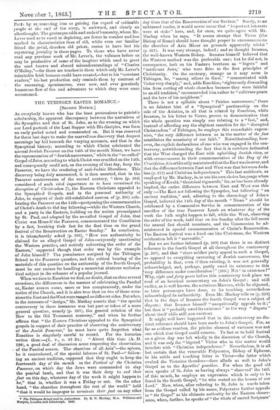MR. LEVER'S LAST NOVEL. 4
Ma. LEVER, like other popular novelists before him who have opened up new fields of fiction with more or less success, seems to find some difficulty in learning that there are limits, not only to the possibility of securing an equal amount of public attention for each one of a series of a dozen novels of identically the same general character, but also to the power of any writer, however pre-eminent in the line he has adopted, to avoid dullness on the one hand, or repetition on the other, while ringing the changes over and over again on the same characters and the same scenes. Even Dumas, with his host of able collaborateurs, historical range, and brilliancy of writing, has almost exhausted the attractiveness of his peculiar style of never-ending adventure. The late Mr. James, with an equal range of historical events with which to entertwine his stories, though without such literary advantages, unquestionably "wrote himself out," as the phrase goes. Fenimore Cooper will be remembered only by one or two of the first of his long series of tales of Indian life ; and Gustave Aimard, who has adopted even narrower limits of locality, scenery, and character, and who produces his tales with unexampled rapidity, merely adds to the surface over which his special talent is spread with each successive volume. Even putting aside the disturbing elements of diversion of public interest, changes of public feeling, and the competition of imitators, it is very rarely that the novelist who breaks fresh ground with success can tell the exact length beyond which any attempt to attain a similar success by similar means will prove a certain failure. If any newly discovered vein of popular fiction is broad enough to offer scope for a series of tales, it soon either attracts miners enough to exhaust it, or exhausts the imaginative power of the one by whom it is monopolized.
Mr. Lever is a striking example of the fatality which attends writers who have achieved great and sudden popularity by the ap- propriation of untouched scenes, characters, and habits of life, and yet do not possess either the judgment necessary to determine how many revolutions of their literary kaleidoscope suffice to exhaust the novelty of these elements of fiction, or versatility to employ their talents in any other direction. When Mr. Lever first appeared before the public as a novelist, he was the undisputed master of a distinctly original and attractive field of literature. Ireland—and especially Galway, Mr. Lever's Ireland—was then ,comparatively unknown to Englishmen, Irish novels were few, and seldom genuinely Irish in tone, and yet the life of Irishmen of family, during the early portion of the century, was as eventful and characteristic as a novelist could wish to depict, while Mr. Lever's power of appreciating true Irish character gave him the one absolutely indispensable qualification for the task. In the days of Mr. Lever's youth, the state of Ireland was vastly diffe- rent from what it has been of late. Every grown man could recollect the events of 1798, and Irish patriotism had not been besmeared with the ridiculous associations of cabbage gardens, mass meetings on Slievenamon, or Feanian• brotherhoods. The military profession was the only one open to men of family, and those who were too far disaffected to enter the English service spread themselves over the Continent, until there was not a European army in which Ireland was not well represented. Reckless, violent, quarrelsome, and yet full of the wildest and most boisterous fun at home, the Irishman of fifty years ago carried his native qualities wherever he went. Foxhunting, duelling, indiscriminate love-making, and contriving absurd hoaxes, form the principal occupations of Mr. Lever's earlier heroes when at home in Galway, and whether fighting under Wellington in the Peninsula, or Napoleon in Italy, or wandering over Europe as exiled adventurers, they never lose their distinctive character. They combine the most broadly • A Days Ride: a Life's Romance. By Charles Lever. London: Chapman and Hall. Ima3.
marked national traits with the widest cosmopolitanism. Mr. Lever's experience of Continental life, and his striking power of impressing his readers not only with the appearance but the associations of the places he describes, are almost unequalled ; and yet he never merges his Galway-born hero in the mere adventurer or visitor. He always acts like a man who has been born and bred amidst extravagant poverty on an encumbered estate, and who has passed his youth in hunting and quarrelling with Galway Burkes and Blakes, or deep drinking, betting, and love-making in a garrison town. There is hardly a capital in Europe that has not been visited by one or more of these wan- dering Irishmen, and one can always feel that Mr. Lever's most graphic description of a scene, or most effective setting of a local story, would have been altogether different had the visitor been other than a Galway man. His heroes are so thoroughly imbued in a Galway atmosphere before they start on their adventures, that they not only preserve their own idiosyn- cracy, but always impress more or less of a Galway character on all surrounding circumstances.
With such untrodden ground to work upon, and so adventurous a type of character for his heroes, it is not surprising that Mr. Lever's earlier works should have at once risen to a considerable popularity. His descriptions of Continental life and towns, then far more objects of curiosity than now, his inexhaustible faculty of inventing, and humorous power in describing, the ludicrous situations, practical jokes, and hoaxes, which abound throughout his stories, and his inimitable manner of narrating historical and personal anecdotes, were all as strik- ing as the scenes and characters he introduced to the public were novel. There was never much attempt at elaborate plot of any kind even in these earlier stories; the female characters in general were either mere flirts, or designing girls in despair of husbands who laid siege to the subaltern hero, and the escape of the latter from their snares generally was among the most ludicrous of his ad- ventures. If, indeed, the volume did close with a wedding, there was never any particular reason why it should not have taken place at the beginning. The overwhelming rapidity with which adventure succeeded adventure, and scenes of rollicking, boisterous fun followed perilous and romantic exploits, all mingled with well-told anecdotes and jovial songs, made up for looseness of construction. Gradually, however,—we have not space to follow Mr. Lever through the numerous tales with which he followed up his first successes—even his stock of Galway adventure became exhausted, his plots became still less coherent, his heroes less original. In one, indeed, " Arthur O'Leary," the character from whom the work is named is merely a weak and totally uninteresting personage, who wanders about Europe without himself getting into any serious scrapes, and only acts as a con- necting link between different scenes and different members of the class of loose Irish " about Europe," which contributes so largely to Mr. Lever's stock of character. Time has, doubtless, had much to do with the exhaustion of interest in this sort of life, and people of the present day only know of Galway as a sub- sidized rendezvous for " stowaways." The Continent, too, is better known now, and marvellous adventures in quiet German towns seem doubly improbable to readers who take trips half over Europe every autumn. In the days when Harry Lorrequer " was written, France, Germany, and Galway were far more fitting scenes for adventure and romance than they are now.
But it is in the book now before us that the exhaustion both of Mr. Lever's favourite themes and of his ability in treating them becomes most apparent. The narrator, or rather autobio- grapher, is a weak and half imbecile youth, with consummate audacity in lying, and a knack of getting into the most absurd scrapes. There is no plot worth mentioning, and this contemp- tible being wanders through Europe, getting into all kinds of absurd positions and difficulties, through his inordinate vanity and irrepressible lying, and then blundering from one ludicrous scrape into another through sheer stupidity. It is the old thing over again, and occasionally Mr. Lever's old brilliancy of inven- tion seems to revive ; but with a few exceptions all the inci- dents are far too outrageously improbable, and Mr. Algernon Sydney Potts' scrapes are generally farcical to the degree at which they fail to excite laughter. There are one or two sketches —such as that of -the English Minister at Hesse- Balbbratenstadt, which are almost in Mr. Lever's old style ; but the two volumes are too much filled with the maudlin or bom- bastic soliloquies of Mr. Algernon Sydney Potts, the imbecile hero, to leave room for the profusion of rollicking adven- ture which characterized his earlier works. An attempt, too, which is made to attach the semblance of interest to
Potts by re, resenting him as gaining the regard of estimable people at the end of the story, is awkward, and clearly an afterthought. The grotesque odds and ends of humanity, whom Mr. Lever used so to excel in depicting, are fewer in number and less marked in characteristics than of old, while even our familiar friend the jovial, drunken old priest, seems to have lost his roystering joviality in these pages. To those who have never read any previous work of Mr. Lever's, the volumes before us may be productive of some of the laughter which used to greet the mad hoaxes and absurd misunderstandings of " Charles O'Malley,"—for there are touches in them which only Mr. Lever's inimitable Irish humour could have created,—but to his "constant readers," his last production only reminds them by contrast of the unceasing, spontaneous, ever new, and ever genuinely humorous flow of fun and adventure to which they were once accustomed.































 Previous page
Previous page